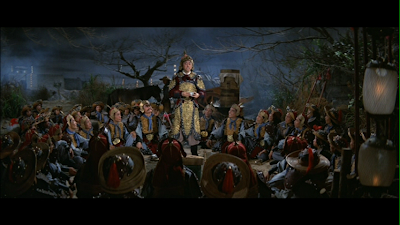Miracles (1989)December 18th, 6:30PM in Garland 104 (2441 E. Hartford)
In 1930's Hong Kong, Jackie Chan plays Kuo Cheng-wah a country bumpkin trying his luck in the big city. Soon after arriving he has a series of bad experiences before receiving a rose from an old destitute flower seller (Gua Ah-leh). Instantly his luck seems to change as he becomes involved in a fight between two large triad gangs only to be made into one of the gangs leaders after the triad members misinterpret their dying leaders last words.
Being far from a criminal Kuo attempts to reform the gangs criminal ways by opening a legitimate nightclub. Soon after he encounters a talented singer (Anita Mui) who he employs at his club in order that she can settle a family debt. After a time he starts to fall into his new life only to be faced with a problem involving the rose seller. He has a belief that her roses bring him luck and will not make a decision or take action until he buys his daily rose. It seems her daughter who has been living in boarding school for most of her life believes her mother is a wealthy social light. Now the daughter has informed her that she will soon be arriving with her fiancé who is the son of a wealthy businessman from the mainland. Now Kuo using the power of his gang attempts to help by convincing her daughter’s fiancé and his family that her clams are true.

Miracles is a remake of the 1961 Frank Capra film A Pocket Full of Miracles which was in fact a remake of a 1933 Capra film Lady For a Day. As surprising as some not familiar with Hong Kong film making might find this next statement, this film might be superior to Capra’s. Those that know of his work and creative output should be well aware of Jackie Chan’s great reverence for the Hollywood films of the 1920's and 30's and this can be said to be his ultimate tribute to them not to mention probably his most polished and personal film. This can also be said to be one of the last great epics of the Hong Kong film industry before its partial collapse after 1993.
The cast of the film is extremely impressive. Containing some of Hong Kong’s greatest principal and character actors in major roles and frequent cameos. Some of the best of these secondary performances include Wu Ma who plays the second in command of Chan’s gang and Richard Ng who has the role of a bumbling police detective.

As for the principal actors, actor/singer Anita Mui finds one of her greatest film roles as Chan’s love interest. The two of them show a kind of kinetic on screen chemistry. She also excels in a scene involving a musical montage showing the clubs development over time. Chan too is in top form both as a actor and in the directors chair. In some ways this film for him can be likened to Hart of Dragon (1985) in that they are both meant to put to rest criticism regarding Chan’s supposed lack of range. In Heart of Dragon he plays the sole guardian of his retarded brother who to some degree is forced to give up his own happiness and prospects for the future to care for him. The film had a lot in the way of drama and little in terms of action. In Miracles there is more in the way of action, but not an excess of it, although what there is remains some of the most impressive pieces of his career. Instead the film relies much more on plot and character development. Some people that are only interested in Chan in action roles might find this a bit slow, but for those that appreciate other elements as well might find one of his best.

In terms of the production values I did not use the term epic haphazardly. The film fielded a very impressive budget for a Hong Kong film of the period and it uses it to construct some massive sets and to import the latest technical equipment from the US and Japan and it shows. Chan had progressed substantially as a director by this period and possesses a strong artistic vison for the film. Also present is the expert cinematography of Arthur Wong and the highly enjoyable jazz score of Lei Siu-Tin who also has a cameo in the film.
This is one of the must see films for those who believes that Jackie Chan is a one trick pony. The only problem that some might find with it is if they came into the film expecting nonstop action and instead found equal parts story, style and characterization.
Hong Kong, Director Jackie Chan. Starring Jackie Chan, Anita Mui Yim-Fong, Gloria Yip Wan-Yi, Wu Ma, Richard Ng Yil-Hon, Bill Tung Piu, Ray Lui Leung-Wai. In Cantonese with English subtitles, 127 minutes.





















